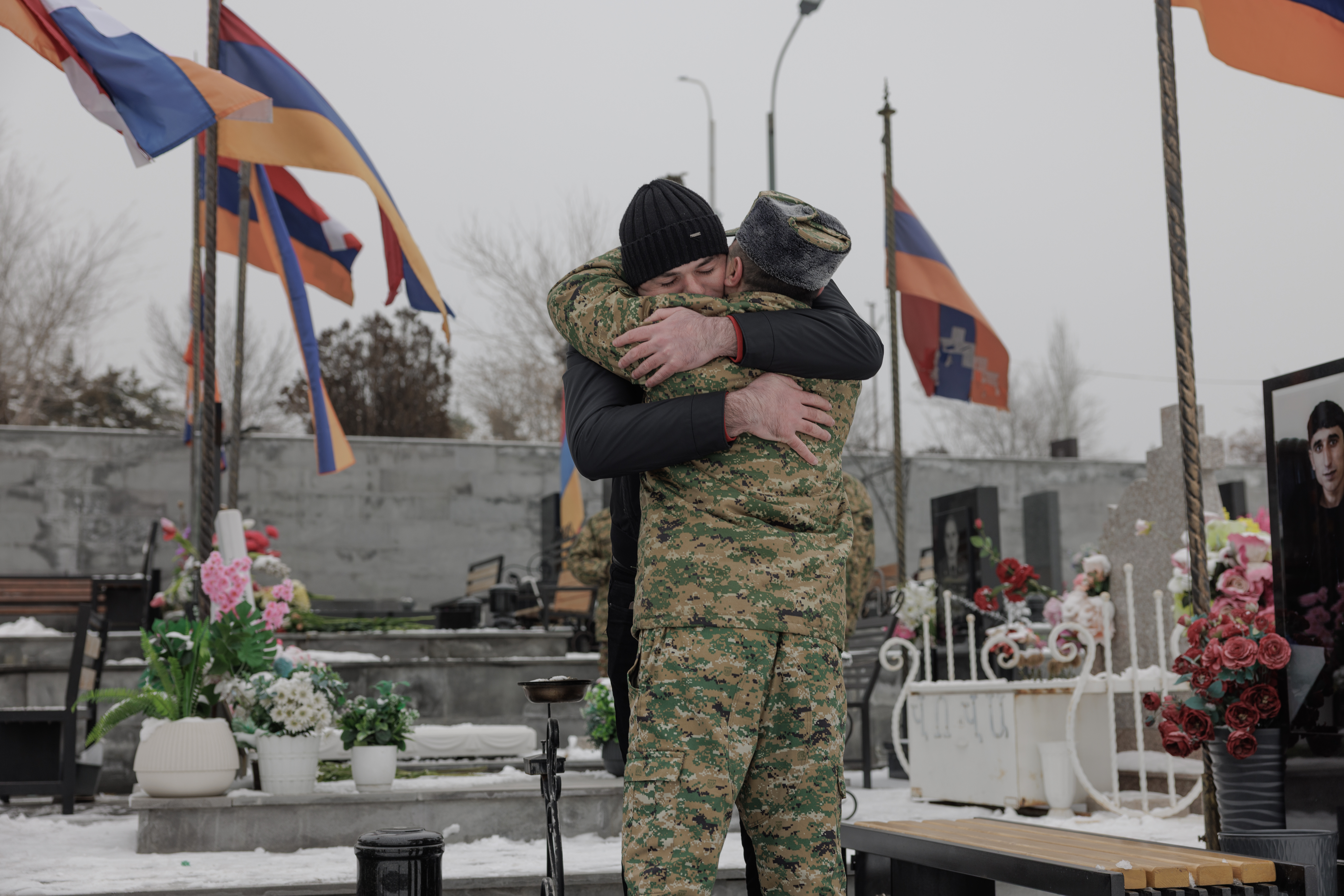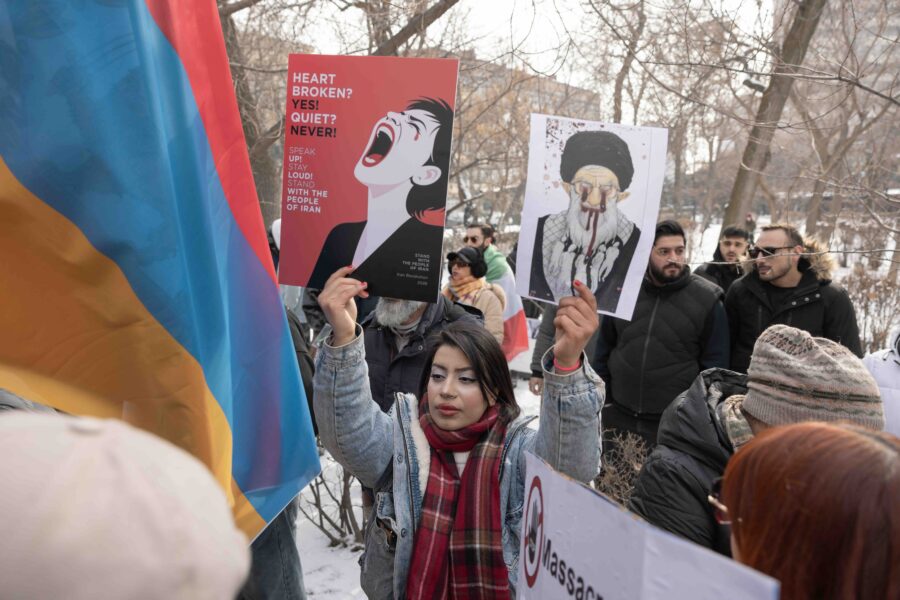Living with the Penguins in Antarctica

Imagine living in a freeze zone by an ice-covered lake named in your honor where the temperature hits 70 below (not counting wind chill) and your best friends are the penguins.
For Dr. Deneb Karentz, it’s just another day on the job—in Antarctica!

The 63-year-old has been traveling to this continent as a researcher and educator for 3 decades now. When the University of San Francisco biology professor returns there each December, she visits Lake Karentz, a 1.3-mile permanently frozen body of water dedicated to her by the United States Board on Geographic Names. Google Lake Karentz and you’ll see some amazing pictures.
“It was something I never expected,” she said. “I thought it was a joke when I first heard about it. I’m obviously quite thrilled and honored.”
Karentz is quick to note her proud Armenian-American lineage, which follows anything in the “ian” and “yan” vanguard. Her first name is after the star Deneb, a very bright star in the Summer Triangle.
“That was my father’s idea,” she noted. “He was interested in celestial navigation in the Navy when I was born. Deneb is part of the constellation Cygnus/Northern Cross.”
Karentz became involved in Antarctic research in 1986 through a chance meeting with fellow University of Rhode Island (URI) graduate Richard Rivkin. A program had developed researching the physiology of phytoplankton in Antarctica and a field team was being pieced together.
“That year we went down was the first time the United States sent a team of atmospheric scientists to look at ozone depletion,” Karentz recalled. “The National Science Foundation decided to fund biological research the following year, so I was in the right place at the right time to initiate a new project.”
While still doing research, back she goes year after year as an educator, bringing polar scientists to Antarctica. Her research focuses on the ultraviolet photobiology of marine organisms, identifying strategies for protection from UV exposure.
It’s no easy task getting there. To reach her destination at McMurdo Station, Karentz first flies to New Zealand. Then, she boards a military cargo plane for eight hours. Getting to the Antarctic Peninsula requires yet another flight to Tierra del Fuego, the southern-most tip of South America, followed by a five-day trip aboard an icebreaker ship to an almost other-worldly spot.
“It’s just a beautiful place to be with fantastic landscapes,” she describes. “There’s nowhere else like it on earth. It’s incredible.”

While most people would shun such a mission, Karentz feels privileged to be there, experiencing life in such a remote place, far removed from ordinary civilization.
Deneb grew up in Jamestown, R.I., the daughter of Rose and Varoujan Karentz, and turned to athletics in high school as a two-sport captain to complement a proud academic standing. She’s been a Californian since 1983, serving on the School Board for the Krouzian-Zekarian-Vasbouragan (KZV) Armenian School. She’s also active on the Bay Area Support Committee for Armenia’s Cosmic Ray Division, a local group that raises funds for research on cosmic rays at the Alikhanian Physics Institute in Armenia.
She recalls her early years as a lifeguard at Camp Haiastan and being active in her church and AYF. She comes from a family deeply entrenched in Armenian affairs, and one that was involved in the formation of the Armenian National Committee for Homeless Armenians (ANCHA).
Over the past 30 years, she’s made the trip to Antarctica no fewer than 20 times. How large is the risk?
“The key to survival is dressing properly to work outside,” she says. “Safety is key…to avoid dangers of thin ice, crevasses, and survival if stranded in the field. As for the penguins, you wouldn’t call them gentle. They are entertaining and fun to watch, extremely cute, but can be very aggressive, loud, and smelly. Every trip I make turns into an adventure.”
About 75 percent of the people there are support staff, not scientists. There are social spaces to congregate for games. Some people do crafting. Others have musical instruments at the station. Outdoor activities such as cross-country skiing and hiking are popular.
Karentz is Professor of Biology and Environmental Science at the University of San Francisco, and received her bachelor’s and doctorate degrees from URI. In between came a master’s degree from Oregon State University.
A two-year sabbatical was spent in Washington, D.C., as assistant program director of Arctic programs. Her Antarctica projects are funded by the Division of Polar Programs at the National Science Foundation.
At the university, she also teaches a graduate course in climate change, along with undergraduate courses in oceanography and evolution. One aspect of her work is to mentor early career scientists.
As far as maintaining her Armenian heritage, “I don’t think I could ever separate my heritage or my AYF experiences,” she said. “My parents and grandparents have been very big influences in my life, and 50 years later I am still very emotionally attached to my culture and identity. It is not something I shall ever lose, no matter where I might dwell.”
‘My Favorite Things’
Armenian book: Favorite recipes of the Cilician Armenian Memorial Church, Ladies Aid Society, Watertown
Film: The Harry Potter series
Music: Old-time rock & roll
Vacation spot: Rhode Island, where I spend my summers at the coast
Athletic team: Toss-up between the Boston Red Sox and San Francisco Giants
Pet peeve: Misuse of apostrophes
Junk food: Twizzlers
Proudest accomplishment: Having a lake named after me, honoring my work in Antarctica as a scientist
Most embarrassing moment: Not remembering someone’s name
Form of relaxation: Baking and playing soccer
Quote: “Enjoy life—this is not a rehearsal!”








It takes dedication to science to work in Antarctica. Wish you many more scientifically fruitful years.
Dr. Karentz joins another Armenian honored in Antartica. Mount Simsarian recognizes the State Department career of James Simsarian as Chief, division of International Scientific and Technical Affairs.
Good to see a Haiastan campmate enjoying her life and career!